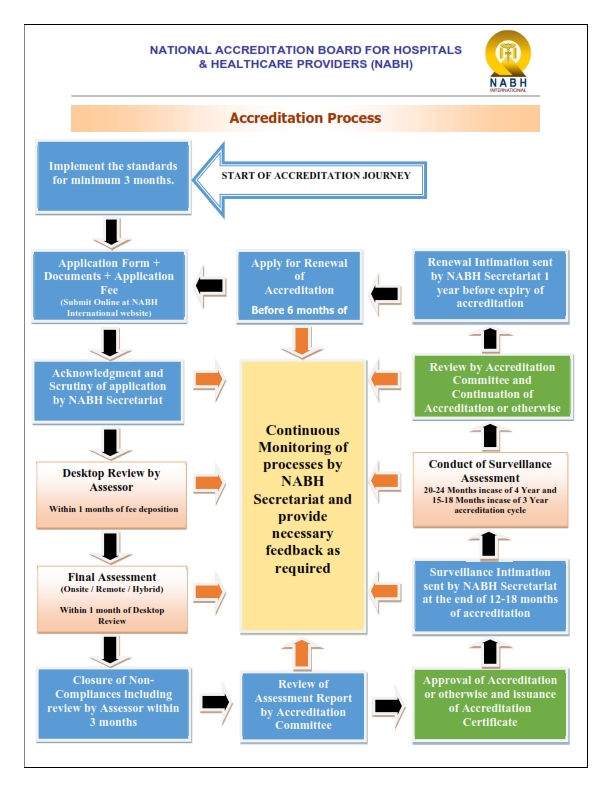What is Accreditation?
The access of patients to quality Health Care Organizations (HCOs) can be ensured through a systematic process called Accreditation. Accreditation is the most important approach to improving the quality of HCOs. Accreditation serves as a guiding force and drives the HCOs to follow standardized procedures in order to ensure patient safety and quality by way of establishing systems, protocols leading to a culture that is safe and patient-centric. Accreditation is a systematic approach to do the rights things as per the right procedure to the right patient at the right time to have the right outcome.
Accreditation is self-assessment and external peer review process used by health care organizations to accurately assess their level of performance in relation to established standards and to implement ways to improve the health care system continuously.
The primary goal of the accreditation is to ensure that the healthcare organisations not only perform evidence-based practices but also give importance to access, affordability, efficiency, quality, and effectiveness of healthcare. Accreditation also helps in branding the country internationally as a cost-effective quality healthcare hub for foreign patients and thereby caters to medical tourism to a larger extent making it a favorable destination for healthcare.
Benefits of Accreditation
Accreditation contributes to the upliftment and betterment of services to all its stakeholders like patients and the public & hospital and its personnel. Accreditation of healthcare organisation is majorly patient-centric and aims to encourage patient safety as the overarching principle while providing care to patients.
Patients are among the biggest beneficiaries of accreditation because
- Patients are informed of the services provided by the organisation.
- Patients are assessed and treated with an appropriate care plan.
- Services are provided by appropriately credentialed and privileged health-care professionals (medical, nursing, and other para-clinical professionals) to ensure patient safety in a safe environment.
- Patient care is uniform to all patients, continuous and multidisciplinary.
- Patients get a safe and organised medication process which is governed by written guidance.
- Safety is Paramount and patients are continuously monitored to mitigate any medication errors and adverse drug reactions.
- National/international patient-safety goals/solutions are implemented.
- Patients are informed of their rights and educated about their responsibilities.
- Informed consent is obtained from the patient or family for providing care.
- Patients and families have a right to get information and education about their healthcare needs in a language and manner that is understood by them.
- Effective Patient-centred communication is the motto of accreditation.
- Provides a safe and secure environment for patients, their families, staff, and visitors.
- Patients & visitors are at reduced risk of healthcare-associated infections.
Healthcare organisation and its personnel are also beneficiaries of accreditation because
- HCO through accreditation demonstrates their commitment to providing safe, patient-centric, and quality care.
- Quality of care through accreditation increases patient Satisfaction and thereby helps the HCO to build in community confidence.
- Governance within the organisation is professional, ethical, and in compliance with all applicable regulations.
- Encourages an environment of patient safety and continuous quality improvement.
- Patient-safety and risk-management issues are an integral part of hospital management.
- Ongoing professional training/in-service education to enhance the competencies and skills of the staff continually which helps in the professional development of staff.
- Effective systems will be in place to prevent any adverse incidents and timely action for any sentinel events.
- Training of staff in all aspects of personal and patient safety during situations like CPR, emergencies during disasters, etc
- The organisation promotes the physical and mental well-being of staff.
Advantage NABH
The following factors distinguish NABH from the other accreditation programs
- NABH Hospital Accreditation Standards are accredited by ISQua which gives the standards international recognition and the standards are benchmarked globally along with others.
- NABH is a constituent board of Quality Council of India which is an autonomous body under the Ministry of Commerce and Industry, Government of India.
- NABH is also supported by other ministries namely the Ministry of Health & Family Welfare, Ministry of Tourism, and others.
- NABH is the only accreditation body that has an accreditation system for Traditional Medicine worldwide. It has independent standards for Ayurveda, Yoga & Naturopathy, Unani, Siddha, and Homoeopathy.
- The standards are designed to facilitate ease of understanding and implementation.
- The cost of investment for NABH accreditation is much lower when compared to other international accreditation programs without compromising on the quality of standards.
Overview of Accreditation Process

Website Counters
Best Viewed by Internet Explorer 8.x,FireFox 30.x, Chrome 40.x, Safari 8.x(Mac), Safari 5.x (Windows) or higher.